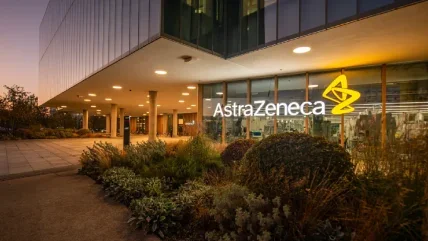
AstraZeneca has received the US Food and Drug Administration (FDA) approval for Calquence (acalabrutinib) in combination with chemoimmunotherapy to treat adult patients with mantle cell lymphoma (MCL).
The chemoimmunotherapy comprises bendamustine and rituximab.
Calquence is a second-generation, selective inhibitor of Bruton’s tyrosine kinase (BTK), which plays a key role in B-cell proliferation, trafficking, chemotaxis, and adhesion.
The BTK-inhibitor plus chemoimmunotherapy is indicated for adults with previously untreated MCL who are not eligible for stem cell transplantation.
The US health agency approved the Calquence combination based on results from the Phase 3 ECHO trial, after granting Priority Review in October last year.
In the Phase 3 trial, Calquence plus bendamustine and rituximab reduced the risk of disease progression or death by 27% compared to standard-of-care chemoimmunotherapy.
Calquence plus chemoimmunotherapy combination showed a median PFS of 66.4 months, compared to 49.6 months with chemoimmunotherapy alone.
In the study, Calquence showed a safety and tolerability profile consistent with its known safety profile, with no new safety signals found.
The US FDA reviewed the regulatory submission for Calquence plus chemoimmunotherapy under its Project Orbis initiative.
The combination is also being reviewed by regulatory authorities in Australia, Canada, and Switzerland for the same indication, as part of Project Orbis.
AstraZeneca oncology haematology business unit executive vice-president Dave Fredrickson said: “With today’s approval, Calquence provides a critical new treatment option to mantle cell lymphoma patients in the US, with Calquence proven to deliver nearly one and a half years of additional time without disease progression.
“This approval brings a new and effective treatment option to those living with this disease and further reinforces our belief in Calquence as a backbone therapy across multiple blood cancers.”
In a separate development, AstraZeneca and Daiichi Sankyo secured FDA approval for Datroway (datopotamab deruxtecan or Dato-DXd) to treat a type of breast cancer.
Datroway is a specifically engineered TROP2-directed antibody-drug conjugate (ADC) discovered by Daiichi Sankyo and jointly developed by AstraZeneca and Daiichi Sankyo.
The drug was designed using Daiichi Sankyo’s unique DXd ADC Technology and contains a humanised anti-TROP2 IgG1 monoclonal antibody.
Datroway is indicated for adults with unresectable or metastatic hormone receptor (HR)-positive, HER2-negative breast cancer who received prior treatment.
FDA approved the drug based on results from the Phase 3 TROPION-Breast01 clinical trial.
In the Phase 3 trial, Datroway significantly reduced the risk of disease progression or death by 37% compared to the investigator’s choice of chemotherapy.
The improvement was assessed by a blinded independent central review (BICR).
Datroway showed a safety profile that was consistent with the known profile of the drug with no new safety concerns identified.
Fredrickson said: “With this first approval of Datroway in the US, we continue to deliver on our ambition for antibody-drug conjugates to improve upon and replace conventional chemotherapy for the treatment of multiple cancers.
“We are proud to bring Datroway to people living with metastatic HR-positive, HER2-negative breast cancer, and this approval marks the eighth new medicine of the 20 we have set out to deliver across AstraZeneca by 2030.”






